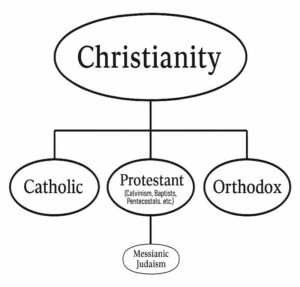The roots of the Messianic movement run far deeper into Western Christian theology than most realize. If you want to truly understand the theology behind today’s “Messianic Judaism,” you must first understand one pivotal historical figure: Augustine of Hippo. I spent 20 years in as a leader in Messianic Judaism and within its institutions, studying, living, and breathing its doctrines. Now, let me take you behind the curtain and explain it as clearly and simply as possible.
1st–3rd Centuries AD
Jesus was a Jewish rabbi who lived and taught in the first century CE.
In the beginning, almost all His followers were Jewish. Even as many Gentiles joined during the second and third centuries, the faith remained deeply rooted in Jewish theology. Its crowning belief — as seen throughout the book of Acts — being that the Messiah had come, was crucified, and resurrected to defeat the curse of death (Genesis 3) on our behalf.
Constantine the Great (307–326 AD)
In the fourth century, everything changed.
Roman Emperor Constantine transformed the simple Jewish faith into a new political state religion — Christianity — by convening the First Council of Nicaea in 325 CE.
Constantine, who was antisemitic, forbade Jewish believers from participating in the council and demanded that all Jewish ties be severed from the newly Romanized faith. Constantine replaced biblical Jewish observances like Passover with Easter, Shabbat with Sunday worship, and Sukkot and other biblical festivals with new Christianized holidays aligned with Roman traditions.
Furthermore, Constantine personally continued worshiping Roman gods. He didn’t agree to be baptised in the name of Jesus until just before he died.
Augustine of Hippo (354–430 AD)
At this stage, the theologian Augustine entered the scene, completing Christianity’s detachment from its biblical-Jewish roots.
Augustine, who was not exactly a lover of the Jewish people either, laid the theological foundations for what would become Western Christianity.
Augustine infused Christian theology with ideas from Gnosticism and especially Neoplatonism, shaping new doctrines such as:
- Original Sin (all humanity condemned to hell because of Adam and Eve’s sin)
- Predestination (God arbitrarily chooses who will be saved from hell)
- Total Depravity (humans are inherently evil and thus all deserve hell)
- Eternal Hellfire (defining hell as a place of endless punishment and torment, aka “Hellfire”).
The Great Schism (1054 AD)
In the 11th century, Christianity split into East (Orthodox) and West (Catholic).
The Western (Catholic) Church fully embraced Augustinian theology, while the Eastern Church largely rejected it.
During the Middle Ages, however, the Catholic Church slowly abandoned many of Augustine’s doctrines and replaced them with other theological frameworks.
Luther and Calvin — The Protestant Reformation (16th Century)
The Protestant Reformation was the rebirth of Augustinian theology.
Martin Luther (Germany) and John Calvin (France) are the theological fathers of Protestantism — both among the most notorious antisemites Christianity produced.
Originally Catholic clerics, they challenged the Catholic Church’s authority and its traditions, perceived as corrupt.
Both heavily drew from Augustine’s theology.
Calvinism, in particular, reinstated Augustinian doctrines.
Calvin also introduced a new Theory of Atonement called Penal Substitution, teaching that God had to punish, torture and kill Jesus, both physically and cosmically, to satisfy divine wrath and spare believers.
This theory became the dominant view in most Protestant denominations, especially the fundamentalist ones.
Evangelical-Protestant Christianity (17th Century)
Evangelicalism is the conservative-fundamentalist branch of Protestantism, rooted in British Puritanism.
The Puritans — strict Calvinists — found even the Anglican Church too liberal.
Thus, evangelical denominations (Baptists, Calvinists, Pentecostals, etc.) share similar theological DNA:
Augustinian and Calvinist doctrines, including Calvin’s Penal Substitution and Augustine’s Eternal Torment in Hell.
For evangelicals, only those who accept Calvin’s atonement theory are truly “born again” and saved from the Augustinian-Calvinist “eternal hell,” provided they endure faithfully (Puritan influence).
Messianic Judaism (20th Century)
Today’s “Messianic Judaism” is a sub-branch within evangelical Protestantism, emerging in the United States in the 20th century.
In Israel, the movement numbers around 10,000 individuals, heavily funded by American evangelicals.
It is estimated that up to 30% of U.S. Messianic Jews and up to 40% of Israeli Messianic Jews have any Jewish ancestry.
The movement is characterized by adopting Jewish customs (e.g., kippah, tzitzit, kosher laws) while maintaining Protestant-evangelical theology.
Most members come from Baptist, Calvinist, and Pentecostal backgrounds — all rooted in Augustinian-Calvinist theology.

In conclusion: despite the name “Messianic Judaism,” there is no theological connection between today’s movement and the beliefs of the first-century Jewish followers of Jesus.
Modern Messianic Judaism is a highly conservative fundamentalist evangelical Protestant subculture, shaped far more by Augustine and Calvin than by the original Jewish apostles.
The leading “Messianic” ministries and their leaders—including ONE FOR ISRAEL (Baptistic-Calvinistic), Chosen People Ministries (Calvinistic), Tree of Life Ministries (Pentecostal), and Jews for Jesus (Baptistic-Calvinistic)—all actively evangelizing the Jewish people, hold firmly to Augustinian-Calvinist theology.
For obvious reasons, Messianic Judaism’s claim to be “Jewish,” while holding to harsh Augustinian theological views—such as the belief that Jews will burn in hell forever—naturally causes deep skepticism, cynicism, and even a sense of betrayal among Jewish communities. Many Jews feel that “Messianic Jews” misuse the identity of being Jewish while embracing a theology historically weaponized against them. This is one of the major reasons why so many Jews today reject Jesus.
In conclusion: Christianity > Protestantism > Messianic Judaism.
If you would like to explore other important reasons, I invite you to consider my book, Why Don’t Jews Believe in Jesus: A Jewish-Christian Unfolds the Great Mystery.




